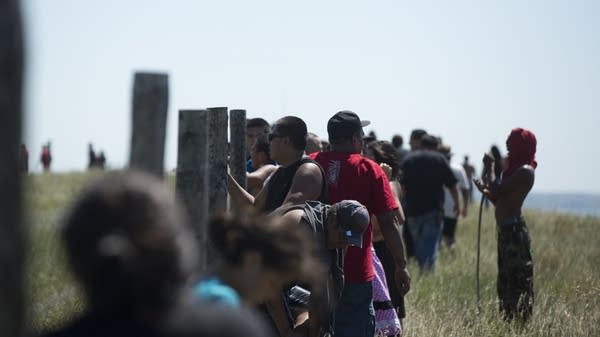Counter Stories: On Being at the Dakota Access Pipeline protest camp

Go Deeper.
Create an account or log in to save stories.
Like this?
Thanks for liking this story! We have added it to a list of your favorite stories.
Rhiana Yazzie found herself almost by accident last week at the protest camp set up near the Standing Rock reservation in North Dakota, where thousands of people have spoken out against the proposed Dakota Access pipeline.
Yazzie's theater company, New Native Theater, happened to be touring at reservations across the country when they decided to go to Standing Rock.
This month's Counter Stories focused almost entirely on the Dakota Access Pipeline project and Yazzie's personal experience at the protest camp, along with reflections on what the protest has come to signify for indigenous people.

But this edition of the monthly conversation is more than what it's about — it's what it shows. It shows what can happen when people tell their own stories unencumbered.
Turn Up Your Support
MPR News helps you turn down the noise and build shared understanding. Turn up your support for this public resource and keep trusted journalism accessible to all.
Yazzie joined regular co-hosts Anthony Galloway, Don Eubanks, Hlee Lee, and Tom Weber.
The collective "we" rings intentional during the conversation. There is no single "Native American culture" in North America, and there never has been.
Indigenous nations have cultural characteristics that distinguish them, but those characteristics don't necessarily function to separate.
One of the remarkable things about the Standing Rock camp, according to Yazzie, was that it brought indigenous nations together who don't necessarily cooperate. She compared the camp to a state fair, but without the commerce. This is something new.
Yazzie maintains the novelty comes from what's at stake: water. "I hope the rest of America gets that we're fighting for our humanity" at Standing Rock, Yazzie added, "and we're fighting for it through our deepest connection to the earth."
The pipeline is designed to travel under the Missouri River at Lake Oahe, and there are fears that a leak would contaminate the water.

"Water sustains us, and if we lose that we lose everything as people." And here, the plural pronoun "us" extends beyond those who belong to indigenous nations. It's in reference to us all.
The company building the pipeline maintains the fears are unfounded and its CEO pledged in a memo to employees to keep working to complete the 1,200-mile pipeline from North Dakota to Illinois, which is more than half built.
Last week, minutes after a court ruling in the pipeline company's favor, the Obama administration announced a halt to construction in the disputed area where the protest camp has grown from a small few in April to representatives from more than 100 tribal nations across the country and North America.
Thinking to the past, Yazzie wondered what indigenous people from 200 years ago, to whom it felt like "everything was lost," would feel about Standing Rock: "if they could know that indigenous nations across the entire country would be there; indigenous nations they had no idea even existed coming in their canoes fighting for this water," they would be astounded. The people from the past might not be able to know. We can, though — but we have to listen.
Dear reader,
Political debates with family or friends can get heated. But what if there was a way to handle them better?
You can learn how to have civil political conversations with our new e-book!
Download our free e-book, Talking Sense: Have Hard Political Conversations, Better, and learn how to talk without the tension.



